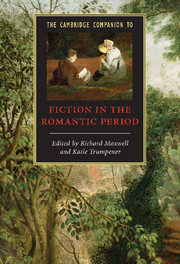Book contents
- Frontmatter
- Introduction
- 1 The historiography of fiction in the Romantic period
- 2 Publishing, authorship, and reading
- 3 Gothic fiction
- 4 The historical novel
- 5 Thinking locally: novelistic worlds in provincial fiction
- 6 Poetry and the novel
- 7 Orientalism and empire
- 8 Intellectual history and political theory
- 9 Women writers and the woman’s novel: the trope of maternal transmission
- 10 Tales for child readers
- 11 Sentimental fiction
- 12 Fiction and the working classes
- 13 The Irish novel 1800-1829
- 14 Scotland and the novel
- Further reading
- Index
- Series List
10 - Tales for child readers
Published online by Cambridge University Press: 28 January 2009
- Frontmatter
- Introduction
- 1 The historiography of fiction in the Romantic period
- 2 Publishing, authorship, and reading
- 3 Gothic fiction
- 4 The historical novel
- 5 Thinking locally: novelistic worlds in provincial fiction
- 6 Poetry and the novel
- 7 Orientalism and empire
- 8 Intellectual history and political theory
- 9 Women writers and the woman’s novel: the trope of maternal transmission
- 10 Tales for child readers
- 11 Sentimental fiction
- 12 Fiction and the working classes
- 13 The Irish novel 1800-1829
- 14 Scotland and the novel
- Further reading
- Index
- Series List
Summary
No sooner had George Crabbe learned to read than he “devoured without restraint whatever came into his hands, but especially works of fiction - those little stories and ballads about ghosts, witches, and fairies, which were then almost exclusively the literature of youth, and which, whatever else might be thought of them, served, no doubt, to strike out the first sparks of imagination in the mind of many a youthful poet.” The child Samuel Taylor Coleridge became so haunted by chapbook stories that his father burned his chapbooks. John Clare's childhood “stock of learning” was all “gleaned from the Sixpenny Romances of 'Cinderella', 'Little Red Riding Hood', 'Jack and the Bean Stalk' . . . etc and great was the pleasure, pain, or supprise [sic] increased by allowing them authenticity, for I firmly believed every page I read and considerd I possesd [sic] in these the chief learning and literature of the country.” Clare spent all his money on such chapbooks. And since “it is common in villages to pass judgment on a lover of books as a sure indication of laziness,” he was forced to “hide in woods and dingles of thorns in the fields on Sunday” to read them.
Around 1800, London schoolboys at Christ's Hospital would offer to exchange the matron's library book, speed-read it on the way back to school, then recount it to each other in bed at night. Such stories and their miscellaneous chapbook reading seemed to them far more interesting than the Greek and Roman classics they spent their schooldays translating. A generation earlier, precocious children just as happily immersed themselves in classical works of drama, poetry, and historiography.
- Type
- Chapter
- Information
- The Cambridge Companion to Fiction in the Romantic Period , pp. 177 - 190Publisher: Cambridge University PressPrint publication year: 2008
Accessibility information
- 3
- Cited by

